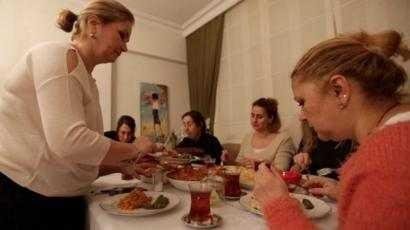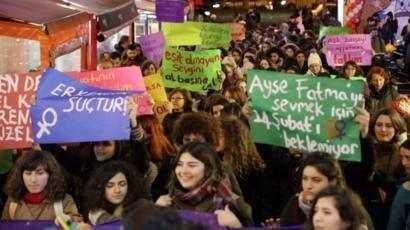
Hot tea dish accompanies classic Turkish dishes in the form of grape leaves, cheese pies and salad bulgur.
For Emel Resuloglu and his friends this activity has become a tradition every month.
Women sit in their dining chairs or local terms "gun", when one of them has little sustenance or gold coins.
Turkey upholds its tradition.
But there are things felt by some who hinder the rate of development of this country from the social and economic side, that women do not work, just placed as a housewife.
"I got an offer at university but my dad did not want me to go to college," said Resuloglu. While that said, the dish on the table was added with a freshly baked cake.
"So I am not working, I am married and have a child at the age of 21 and regret not going to college.
"Some women do not get a job and some are married early.This is an old-fashioned mentality."

Women 'imperfect'
Only 34% of the female population in Turkey works, the lowest percentage among the 35 developed industrial countries in the Organization for Development and Economic Cooperation (OECD) group.
If averaged, the number of women in OECD countries working reached 63%.
Parties opposed to President Recep Tayyip Erdogan said the rhetoric worsened the situation in the country. In an event two years ago, Erdogan called women who do not have children as "imperfect".
Earlier, President Erdogan called on women to have at least three children. He also called the family planning program a "betrayal".
Turkey is now ranked 130th out of 144 in the index of gender imbalances of the World Economic Forum. The index is based on access to health services, educational attainment, economic participation and political empowerment.
Nevertheless, according to Ravza Kavakci Kan, a member of parliament from the ruling AK Party, the government has freed conservative women by lifting the ban on the use of hijab in official institutions that have been applied for a long time.
"This step allows women who choose to wear the hijab to join the workforce and pursue education," he said.
"But this policy takes time at the implementation level."
After all, is it okay for the president to tell women how many children should they have or criticize those who choose not to have children?
"As a president, he sees the future of our society," explains Ravza Kavakci Kan.
"Turkey is experiencing an aging population and we need more young people, so its consideration is purely demographic."
There are only two women who sit in the Turkish cabinet, one of whom is the minister of family affairs.
"Our condition is better than before but there are still many things that need to be addressed, just like in many countries." Such is the recognition of Kavakci Kan.
The economic impact of this gender inequality is unclear.
A study conducted by consulting firm McKinsey found that if women's participation in the Turkish labor force rises on a par with the average OECD, it can boost economic output by 20% by 2025.
To achieve this goal, the European Bank for Development and Reconstruction provides financial support to 15,000 women entrepreneurs in Turkey.
One of them was Aynur Gumussoy from the town of Kizilcahamam, in the heart of the conservative Anatolian region.
Twenty years ago, he changed the fate of a street food vendor into a shop owner selling cakes, local food and breakfast. Cafes like this usually become the business area of men only in Turkey.
The bakery's place produces a bazlama, a typical local round loaf. And local food includes a variety of sweet jams, rich olives and cream-rich cheeses.
"When I started, I had trouble," he said.
"People mock women who work, they feel sorry for me, even my parents are almost embarrassed, but I am now a model for others," he added, pointing to the shops in the city now owned by women .
"My message to women is to dare and look into the future," he said with a laugh. "If I lose confidence, I will not be here right now."

But in Turkey, Aynur Gumussoy is an exception.
The prevailing general trend toward a patriarchal society, conservative values and religion is increasingly dominant. And the subjectivity culture of women here is in line with the increase in domestic violence.
About 40% of Turkish women experience physical abuse. About 300 to 400 people die each year due to physical violence.
Official statistics show the number of cases of domestic violence reported increased by 1,400% between 2003 and 2010. According to the government, the increase in figures occurs because women are encouraged to report cases experienced.
On a cold night in Istanbul, about 200 protesters from a group voicing women's issues marched in the secular region of Besiktas. They carry banners and shout yel equations of sex.
An activist, Feride Eralp, argues that confining women at home is a major factor behind an increase in domestic violence.
"The fact that women do not have economic freedom is one of the main factors why they can not escape the violence in their lives," he explained.
"They are forced to maintain a relationship with a rough partner because they are dependent on the men.
"Mentality has to change in this, from top to bottom, there is the notion that women are naturally out of alignment with men and where women only take care of families, they are supposed to be wives and daughters."
When protesters broke into the alleys of Besiktas, they were ordered to stop the action by a group of policemen. They refused and resumed action into the heart of the neighborhood, the fish market.
Their voices contain opposition, in the form of a call for women to work and against the domination of men. But in Turkish society that is now polarized, their voices are getting immersed.source